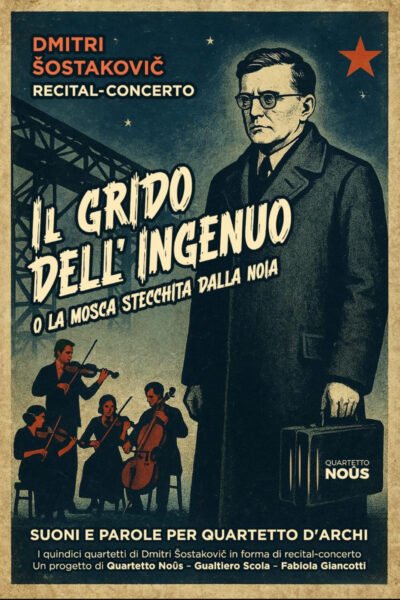“IL GRIDO DELL’INGENUO”

Dmitri D. Shostakovich, the immense Russian musician, was born in St. Petersburg in 1906.
His works are a synthesis of the arts — music, theatre, cinema, literature, poetry, painting — and of historical contexts, from the 1917 Revolution to the dictatorships of Lenin and Stalin.
Shostakovich died in 1975, without witnessing the fall of the USSR. His worldwide fame did not prevent him from celebrating the elegy of Russia and giving voice to those who, torn between acceptance and refusal, never fully grasped the absoluteness of his music.
Written between 1938 and 1974 at irregular intervals, the fifteen string quartets embrace — through irony and sarcasm, the grotesque and the absurd, sorrow and joy — the full spectrum of his expressive colours, amplified by a sublime compositional technique. In this way, he wrote his revolution and his rejection of every attempt to confiscate freedom. And, as with every true artist, the innocence of music could never be violated or seized by any regime that sought to exploit it.
Fifty years after the composer’s death, the performances of Quartetto Noûs meet Fabiola Giancotti’s text and Gualtiero Scola’s dramaturgy in The Cry of the Innocent (Il grido dell’ingenuo), a recital-concert in which music, reflections, and words are inspired by Shostakovich’s notes, biography, and poetics — by his triumphs as well as his sorrows.
Almost a quintet for strings and voice, the performance outlines a scenic journey that invites us to an artistic and human empathy with the great composer, to reflect with him on the dynamics of power that still today threaten peace and coexistence, and to join his cry, his unceasing denunciation.
The Cry of the Innocent is also our cry today: the cry of European artists and citizens who refuse to silence their hearts and souls at command, turning back the hands of time to eras of errors we believed unrepeatable.
The Cry of the Innocent is the cry of those who openly stand for peace, for they are its constant makers.
——————————
Dmitri D. Šostakovič, l’immenso musicista russo, nasce a Pietroburgo nel 1906. Le sue opere sono una combinazione di arti — musica, teatro, cinema, letteratura, poesia, pittura — e di contesti — dalla rivoluzione del 1917 alla dittatura di Lenin e di Stalin.
Šostakovič muore nel 1975, senza poter essere testimone della caduta dell’URSS. La popolarità planetaria non gli impedisce di celebrare l’elegia della Russia e di dar voce anche a chi, fra l’accettazione e il rifiuto, in quella terra, non ha mai colto l’assoluto della sua musica.
Scritti tra il 1938 e il 1974 a intervalli irregolari, i 15 quartetti accolgono, fra l’ironia e il sarcasmo, il grottesco e l’assurdo, il dolore e l’allegria, l’intero arcobaleno dei suoi colori amplificati da una sublime tecnica compositiva. Si scrive così la sua rivoluzione e la non accettazione di ogni forma di confisca della libertà. E anche nel suo caso, come nel caso di ciascun artista, l’innocenza della musica mai sarà violata o sequestrata da alcun regime che la vorrebbe al suo servizio.
A cinquant’anni dalla morte del compositore russo, le esecuzioni del Quartetto Noûs incontrano il testo di Fabiola Giancotti e la drammaturgica di Gualtiero Scola nel “Grido dell’ingenuo”, un recital-concerto nel quale musica, pensieri e parole sono suggerite dalle note, dalla biografia e dalla poetica di Šostakovič, dai suoi successi come dai suoi dolori.
Quasi un quintetto per archi e voce a delineare un percorso scenico che ci invita ad un’empatia artistica ed umana con il grande compositore, a riflettere con lui sulle dinamiche di potere che ancora oggi minacciano la pace e la convivenza, e ad unirci al suo grido, alla sua denuncia costante.
Il grido dell’ingenuo è oggi anche il nostro grido, quello di artisti e cittadini europei che rifiutano di spegnere a comando i loro cuori e le loro anime, riportando indietro le lancette del tempo ad epoche di errori che credevamo irripetibili.
Il grido dell’ingenuo è il grido di chi si schiera apertamente per la pace, poiché ne è costantemente artefice.
